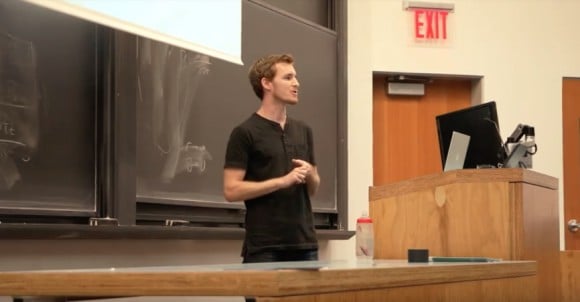Showing students the science behind plant-based and cell-based meat

GFI scientist Elliot Swartz, Ph.D., recently visited Princeton University to give a talk on the future of food, tapping into the ground-up enthusiasm on the campus. Building out the talent pipeline for the rapidly growing plant-based and cell-based meat industries is crucial for long-term success.
Through our GFI Campus Fellows Program, the GFI Innovation and SciTech teams have spoken at dozens of universities so that future innovators, scientists, and business leaders consider applying their talents in these fields.
As a GFI intern and current Princeton student (for a few more weeks at least!), I was thrilled to bring Elliot to campus to share the science of plant-based and cell-based meat with my classmates.
Here’s a snapshot of what GFI’s campus engagement looks like:
Looking out at a crowd of fifty students, Elliot explained the “high motivation for driving new technologies to change animal agriculture.” (Essentially, how will we feed 10 billion people in 2050 while also addressing climate change and avoiding pandemics from antibiotic resistance superbugs? Plant-based and cell-based meat will play a crucial role.)
Elliot started his career in neuroscience, not food technology. One attendee admitted she was “really surprised by his background in neuroscience given his jump into food science with cell-based and plant-based meat.” To Elliot, this transition illustrates how people with all different skill sets can—and should—get involved.
This was an apt point, given the wide range of backgrounds the attendees brought to the auditorium: some were in their final years of a Ph.D. program in Molecular Biology, while others were undergraduates studying financial engineering. Many were passionate about environmental sustainability, and some just loved cool new technologies. But they all wanted to learn about the science and market opportunities driving the plant-based and cell-based industries.
For many, it was their first time learning about the science behind these innovations. Dee-Dee, a third-year undergraduate, commented that she knew that plant-based and cell-based meat “existed, but I didn’t understand them.”
Elliot framed the technologies in a new light for the students, explaining that plant-based meat “fundamentally works by biomimicry of meat from the ground up.”
“When you think about what meat is made out of, it’s just kind of proteins, water, micronutrients, and all of those things can be made from plants.”
By contrast, he explained that cell-based meat grows the cellular components of animal meat from a small animal cell sample. The finished product is, well, meat.
(If you want more of a deep dive on the science behind these technologies, check out GFI Senior Scientist Dr. Liz Specht’s article explaining how to make meat with plants and cells here.)

Christina, a Ph.D. candidate in chemistry, said afterward that she had thought she already “knew what was going on in the cell-based industry, but it turns out I didn’t.”
“The level of detail in his presentation was phenomenal. He really gave us a crash course.” She was especially excited to learn about the “gaps in the technology to making cell-based meat viable on a large scale.”
“I was furiously taking notes the whole time,” she joked.
(If you want your own personal lesson on Plant-Based and Clean Meat 101, you can sign up for GFI’s free online course here.)
After the talk, Esther, a fourth-year undergraduate, said that she “hadn’t realized how much of a pressing need it was to find alternative ways to sustain the world’s population.” Many people aren’t aware of the environmental externalities, food security challenges, human rights violations, antibiotic use, and realities of animal conditions in conventional meat production. For her, the talk really underscored the need for developing better solutions.
Christina said that she was shocked to learn about the “magnitude of growth” in this field. She smiled, saying “I wrote down the name of every company in his presentation.” After the talk, she felt “more excited” about opportunities to get involved in shaping the future of food.
That’s the goal!

